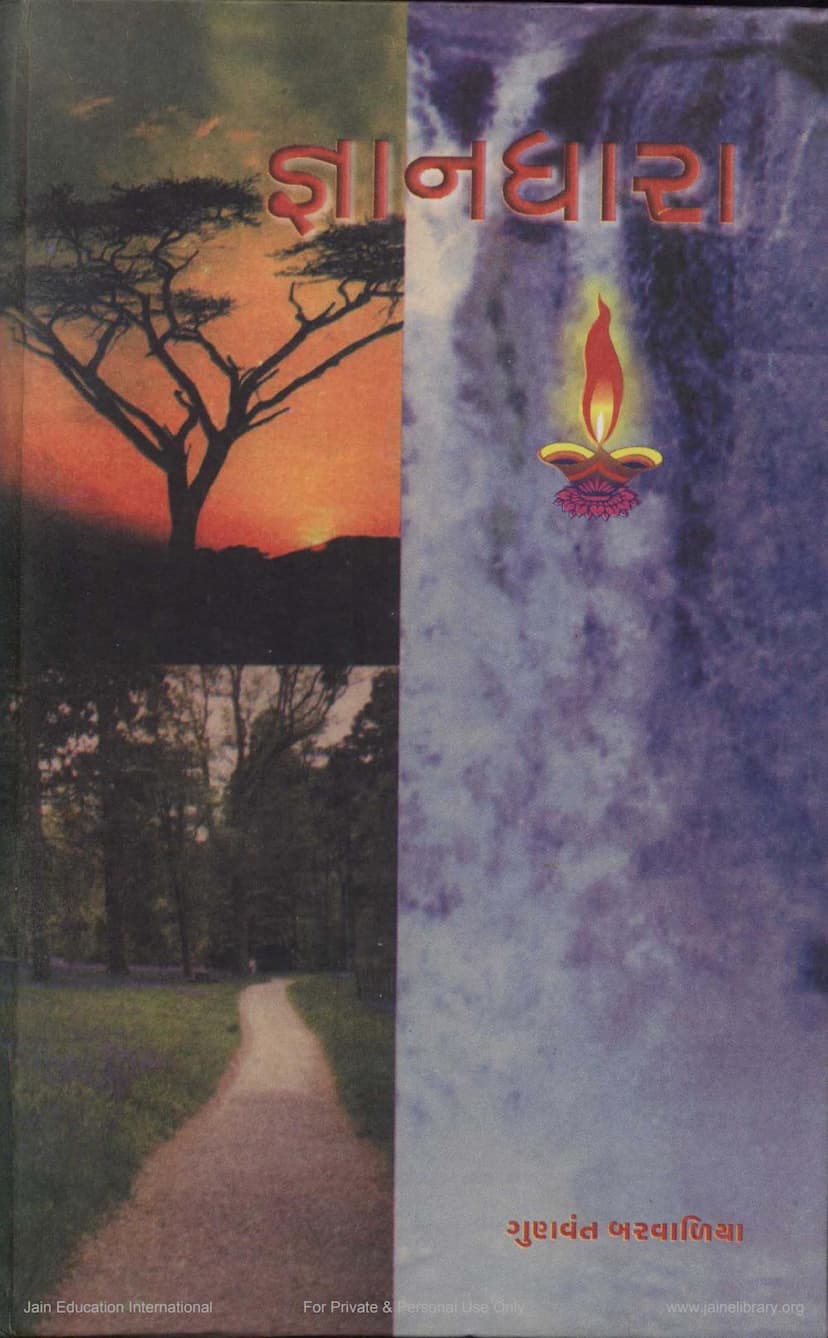Gyandhara
Added to library: September 1, 2025

Summary
Here's a comprehensive summary of the Jain text "Gyandhara," based on the provided pages:
Book Title: Gyandhara (જ્ઞાનધારા) Author: Gunvant Barvalia (ગુણવંત બરવાળિયા) Publisher: Saurashtra Kesari Pranguru Jain Philosophical and Literary Research Centre Context: Gyandhara is a collection of essays and research papers presented at the Second Jain Literature Knowledge Convention (જૈન સાહિત્ય જ્ઞાનસત્ર-૨).
Overall Purpose: The book, "Gyandhara," serves as a compilation of scholarly discussions and presentations from a Jain Literature Knowledge Convention. The primary aim of these conventions, as indicated in the text, is to bring together scholars interested in Jain literature and research, foster the exchange of ideas, and promote the expansion of scriptural knowledge (Shrut Sanvardhan) and service to the Jain faith (Shasan Seva). The convention also aims to bridge differences between various Jain sects (Sthanakvasi, Murtipujak, Digambar, Terapanthi) by providing a platform for scholars from all traditions to express their views freely.
Key Themes and Content:
-
The Second Jain Literature Knowledge Convention (Gyansatra-2):
- Date: January 8-9-10, 2005
- Venue: Paras Hall, Rajkot
- Inspiration/Guidance: Acharya Shri Namramuniji Maharaj Saheb and other Sants and Sadhvies present in Rajkot.
- Organizer: Saurashtra Kesari Pranguru Jain Philosophical and Literary Research Centre, Ghatkopar, Mumbai.
- Motivator: Uvasaggaharam Sadhana Sangh, Mumbai-Vadodara.
- Significance: The convention brought together around 60 scholars from all four sects of Jainism. It was inaugurated by the Hon'ble Finance Minister of Gujarat, Shri Vajubhai Vala. The event emphasized the importance of propagating Lord Mahavir's principles and the value of satsang (company of the virtuous) for self-realization.
- Highlights: The release of "Gyandhara-1" (the compilation of papers from the first convention), the launch of a CD on Medieval Jain Literature, and discussions on various Jain philosophical and practical topics were key features.
-
Essays and Research Papers (Content Overview): The book contains numerous papers covering a wide range of topics relevant to Jainism, youth engagement, societal issues, and philosophical analysis. Some of the prominent themes and specific paper titles include:
- Youth Engagement and Dharma Propagation: Several papers focus on strategies and programs to attract youth towards Jainism and spread its teachings. This includes making religious education relevant, understanding youth psychology, and using modern communication tools.
- Jain Unity, Organization, and Harmony: Papers discuss the need for unity among the various Jain sects and the importance of organized efforts for the propagation and preservation of Jainism.
- Human Service (Manavseva) and Compassion (Jivdaya): The role and practice of serving humanity and all living beings is highlighted, emphasizing the compassionate aspect of Jain teachings and its relevance in contemporary society.
- National Thought (Rashtra Chintan): Some papers explore Jain principles in the context of national well-being, ethical governance, and the duties of citizens towards the nation, often linking it to the broader principles of non-violence and environmental protection.
- Vedic Principles and Scientific Outlook: Several papers delve into the scientific underpinnings of Jain philosophy, demonstrating how ancient Jain teachings align with or even precede modern scientific discoveries in areas like physics, biology, psychology, and environmental science.
- Ahimsa (Non-Violence): This is a recurring and central theme, explored in detail from philosophical, practical, and societal perspectives, including its definition, forms, importance, and implementation. Papers discuss the nuances of Ahimsa in Jainism compared to other religions.
- Karma Theory: The philosophical and scientific aspects of the Jain doctrine of karma are analyzed, explaining its role in the cycle of birth and death and the path to liberation.
- Moksha and Spiritual Practice: The ultimate goal of Moksha and the practices leading to it, such as meditation, self-discipline, and adherence to vows, are discussed.
- The Importance of Jinas' Teachings: The papers consistently emphasize that the core teachings of the Tirthankaras, especially Lord Mahavir, are scientifically valid and relevant for modern life.
- Practical Implementation: Many papers offer practical suggestions on how to make Jain principles accessible and appealing to the younger generation, emphasizing the need for updated language, relevant examples, and modern communication methods.
-
Founding of the Saurashtra Kesari Pranguru Jain Philosophical and Literary Research Centre: The book also provides details about the establishment and objectives of the Research Centre, founded in memory of Shri Prannlalji Maharaj Saheb. Its aims include the study, research, editing, and publication of Jain philosophy and literature, promoting scientific presentations of Jain principles, preserving ancient manuscripts, and providing scholarships and guidance to students and researchers.
-
Inspirational Figures: The convention and the publication are inspired by the guidance of Pujya Shri Namramuniji Maharaj Saheb and are dedicated to the memory of Shri Ramanlal C. Shah, a scholar and contributor to Jain literature.
In essence, "Gyandhara" is a testament to the vibrant intellectual and spiritual discourse within the Jain community, reflecting a conscious effort to bridge ancient wisdom with contemporary understanding, and to ensure the relevance and propagation of Jain teachings for future generations.